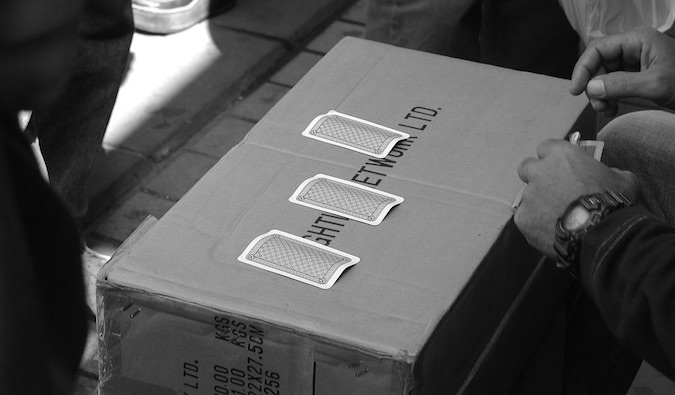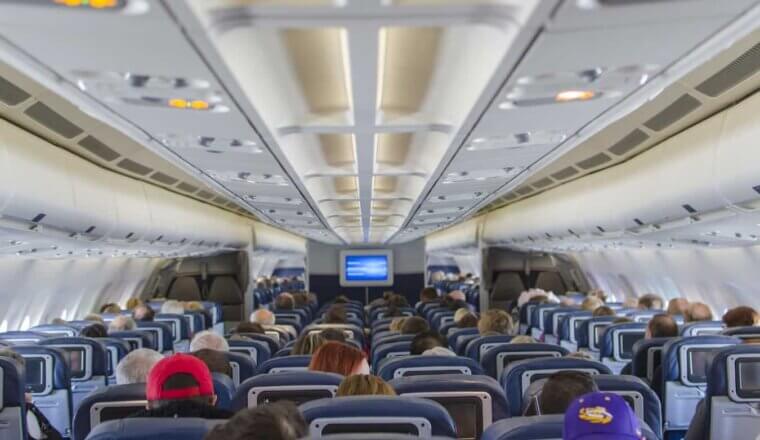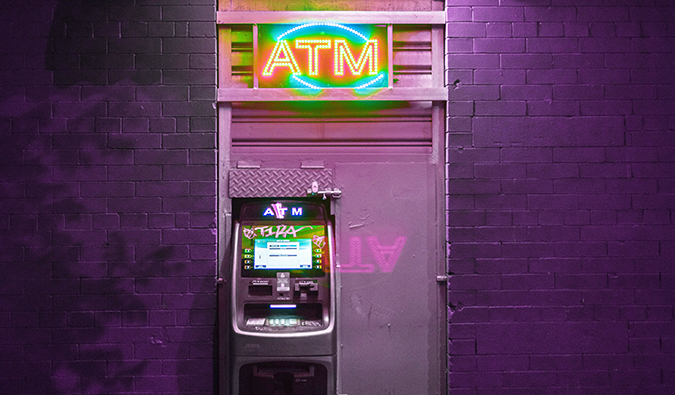18 Major Travel Scams to Avoid

On my first big trip abroad I got scammed twice on the same day.
My friend Scott and I had just arrived in Thailand. We were in Bangkok trying to find a boat cruise to take us up and down the Chao Phraya River. A taxi driver suggested this one company; we went there and found out that an hour-long tour was only $30 USD.
Not even thinking about whether that was a deal or not, we agreed. To us — still thinking about prices back home — that offer seemed like a fair price. It was only as the boat tour ended early that we realized we might have been ripped off (later on, we found out that we paid double the price).
Then, after lunch, we wandered over to the Grand Palace. When we got there, we didn’t see any crowds. We looked down the left side of the palace, then over to the right.
“Where is everyone?” I asked.
An enterprising tuk-tuk driver came over to us and told us the palace was closed for lunch. Scott and I looked at each other. Maybe that was right. After all, many museums sometimes do that, plus we didn’t see anyone around. It seemed feasible. He offered to take us to a few that were open.
“Sure,” we replied — and found ourselves visiting not only a few temples but also a suit shop, a gem shop, and a souvenir shop.
Afterward, he took us to the palace (which was unsurprisingly open). It was then we realized that it had never been closed — we had just been on the wrong side of the building.
We had been scammed.
My life as a traveler was not off to a good start.
Travel scams are real — and they vary from country to country. If you are carrying a travel guidebook, it will list the most common scams in that specific country.
To help you stay safe, today, I want to give you a list of common travel scams to avoid.
Avoiding travel scams requires a lot of common sense and a healthy dose of suspicion. If it seems too good to be true, it probably is!
Here are some of the more universal scams you’ll want to avoid:
Table of Contents
- 1. The taxi overcharge
- 2. Your accommodation is “closed”
- 3. The shell game
- 4. “Come in for tea and help me write a letter!”
- 5. Free bracelets/rosemary/anything they can put on you
- 6. The spill on your clothes
- 7. Motorbike scam
- 8. The flirtatious local
- 9. Your attraction is closed for lunch
- 10. The “found” ring
- 11. The fake petition
- 12. The drug deal gone bad
- 13. The wrong change
- 14. The switcheroo
- 15. The ATM scam
- 16. Child & injured beggars
- 17. Fake Wi-Fi hub
- 18. Fake currency scam
- STAY PROTECTED ON THE ROAD!
1. The taxi overcharge
This is one of the most common travel scams out there. Either the driver will tell you the meter is broken and try to charge you a huge rate or you’ll see the meter go higher and faster than usual
To avoid this scam, first, you need to know how much a ride should cost. I always ask the hostel or hotel staff what a ride should be so I have a frame of reference.
Next, if the cabbie tries to negotiate the rate with me, I offer him the correct rate. If he refuses, I find someone who will put the meter on. If the meter seems to be going up too quickly, I have them pull over and I get out. Many tourism boards let you report bad cab drivers so be sure to always make a mental note of their ID number when you get in the cab.
When in doubt, ask your hostel/hotel staff to call a cab for you. They will know which companies are reputable.
And never get in an unlicensed cab — no matter how amazing the deal is!
2. Your accommodation is “closed”
This is another cab-driver-related scam. In this scam, your driver will tell you your hotel or hostel is overbooked or even closed. It’s not. I mean, you wouldn’t have booked it if it was, right? Just ignore them and insist on going there. If they keep trying, continue to insist. They will usually shut up about it.
And while this seems like a scam no one could possibly fall for, people do. I’ve been in many cabs where they insist my hostel has been closed for months.
A note on taxis: In this smartphone era, we have our power back. We’re no longer helpless because we can look on a map and see the actual correct route. I like to look on Google Maps and see what the best route is. If it looks like they aren’t taking it, I’ll usually point to the map and insist they go that way. (I once left a taxicab in Bangkok because he tried to pull a fast one on me by taking a longer route.)
If I’m going to a country where I won’t have phone access, I download the map onto my phone. Your phone’s GPS will work even if you don’t have a connection. Additionally, ride services like Uber place accountability on drivers, which greatly reduces the likelihood of you being cheated.
3. The shell game
I see this one all the time — how people fall for it I’ll never know. It’s such an old and obvious scam. It’s in movies, for heaven’s sake! You’ll see people on the street playing a card game (sometimes known as three-card Monte) or hiding a ball in a cup and someone guessing where it is and winning money. Then you decide to play — and you win! Thinking this is great, you bet more money…and then you lose — and lose again and again.
Here’s a short video on how the trick works:
Don’t get suckered into this con. Remember, the house always wins!
4. “Come in for tea and help me write a letter!”
While in Morocco, someone tried this travel scam on me. I was walking out of a convenience store when a guy struck up a conversation. Finding out I was from NYC, he said he had a cousin who lived there (the first giveaway) and wanted to know if I could come to his shop to write a postcard for him (the second giveaway).
The goal here was to get me in the shop, maybe give me some tea, and then pressure me into buying something. This uses the psychological principle of reciprocity: he gave me tea, he was nice to me, so soon I’ll feel socially obliged to buy something.
Similarly, a common tea scam in China involves a beautiful local woman who wants to practice English. Due to the culture shock, many men are more than happy to speak English to a friendly local. She invites you to try a tea ceremony, so you go to a tea house (commonly near the Forbidden City).
After a while, the owners bring you the bill, it’s a huge amount of money and the owner threatens to call the police unless you pay up. As most travelers don’t want any problems, they pay up.
To avoid this, don’t follow people to a second location or believe they suddenly have a cousin who happens to live exactly where you do!
5. Free bracelets/rosemary/anything they can put on you
In this scam, common in Europe, a friendly person will approach you for a quick chat, then place a bracelet around your wrist or hat on your head, or give you a little sprig of rosemary. Once you have it on your person, they will demand money. When you refuse, they will begin to cause a scene in the hopes you would rather give them some money than be embarrassed.
Don’t allow anyone to put anything on your body, and be extremely wary of accepting anything for free. If they put something on you, simply take it off, give it back to them, and be firm about it. Then walk away and move on with your day. They won’t chase you.
Another common variation on this scheme is the fake monk. You’ll find this one everywhere from NYC to Europe to Asia. The “monk” will put a Buddhist bracelet on your wrist and then ask for a “donation.” Real Buddhist monks don’t wander the streets hawking cheap bracelets, so always ignore any monks that look to be peddling trinkets.
6. The spill on your clothes
There you are, minding your own business, and someone spills something on you. Ruins your day, but accidents happen, right? They are profusely sorry and offer to clean it up, dabbing the stain, and apologizing. While you are all flustered, they are picking your pocket. By the time you realize what has happened, they are long gone.
This scam is also common in Europe. Beware of people encroaching on your person if it’s not a crowded area already. If this happens, push people away and clean it up yourself.
Another variation on this is the “poo shoe.” Particularly common in India, this scam involves someone squirting animal poop on your shoe when you’re not looking. When you notice, they “help” you find someone to clean your shoe (or they do it themselves) for an exorbitant fee. Conversely, sometimes you will just get pickpocketed while looking down at your shoe to see what happened.
Either way, if you get poop on your shoe, be wary!
7. Motorbike scam
You rent a motorbike and spend the day exploring. When you bring it back, the owner demands an additional payment or expensive repairs because there is some damage you didn’t know about. In some cases, they will have asked you to leave your passport as collateral instead of a deposit “since it’s easier.” Then, when they inspect the motorbike afterward and “find” new damage, you have to fork over a lot of money because they’re holding your passport hostage.
I see this scam a lot in Southeast Asia and other developing regions of the world.
To avoid this, take photos of the bike first to document any previous damage. Go around it with the owner so they know what you are taking pictures of. Use your own lock, and keep the bike out of sight and off a main street when you park it. Sometimes an owner will send someone to mess with the bike or steal it so you have to pay!
Also, always make sure you buy travel insurance so you can make a claim if there is an issue.
(This scam is much less common with rental cars, but it can still happen so always take photos and video of your vehicle before you leave the parking lot — and make sure the company knows you’re doing so.
8. The flirtatious local
You arrive in a new country and head to a bar, where a beautiful local comes up to you for a chat. You can’t believe your luck. You have some drinks and amazing conversation and go to a new bar or club that she suggested. However, after a wild night and lots of drinks, the woman disappears and you’re forced to pay an overpriced bill with some really big guys bearing down on you to make sure you do. Or, worse, you get drugged and wake up completely robbed of everything on you.
Another thing to be aware of is that when attractive locals are sitting by themselves at a bar they might be ‘working’ (i.e. a sex worker). It’s important not to get into an uncomfortable position where you may have misread the “chemistry” for what it really was: a business transaction you need to pay for.
The simple solution to this is to be wary of attractive locals who promise to take you to the world’s best club, get you drinks, or are overly flirtatious — especially when you stand out like a sore thumb as a foreigner. Getting on a plane didn’t increase your attractiveness by a factor of 10.
9. Your attraction is closed for lunch
As mentioned, this is what happened to me and I fell for it hook, line, and sinker! A friendly local approaches and informs you that the attraction you want to visit is closed for any number of reasons (religious ceremony, holiday, etc.). Then they’ll guide you to a different attraction or shop, where you’re pressured to purchase something or pay a lot for entry.
To avoid this, find the main entrance or ticket counter and see for yourself. Also, keep in mind that most attractions don’t close for lunch — they close for the day. Even better, look up the open hours before you go, so you know what to expect — opening and closing times are almost always available online. Don’t be like me!
10. The “found” ring
An innocent-looking person picks up a ring on the ground and asks if you dropped it. When you say no, the person looks at the ring closely, then shows you a mark “proving” that it’s pure gold. He or she offers to sell it to you for a better price. They make some money, and you get some gold you can resell. It’s a win-win! You think it’s a good deal, buy it find out it’s fake when you try to sell it at home!
This is common in Europe. One of my tour members almost fell for it when we were in Paris, but I intervened in time and sent the person away. The best way to avoid this scam is to not buy the ring. If it sounds too good to be true, it definitely is.
11. The fake petition
You’re at a popular tourist sight and a woman or kid (often pretending to be deaf or a student) will try to get you to sign a petition. You don’t know what they are saying, and to end the awkwardness, you sign the petition, hoping they will go away. But the petitioner then demands a cash donation. At best, anyone who falls for this scam is out some money; at worst, they’re pickpocketed while fighting with the petitioner.
Another one of my tour members fell for this scam (even after I warned him specifically about it), but I saved him in time. To avoid this scam, just ignore people coming up to you to sign a petition, especially when they are in groups and try to surround you. Just keep on walking.
12. The drug deal gone bad
This scam is common in many developing countries — especially those with a lively party scene like in Southeast Asia. You’re in a popular tourist area and someone offers you drugs. You say yes, and before you know it, a (real) cop is on the scene! They threaten to arrest you unless you pay a fine right there (i.e., a bribe). If caught red-handed, you’ll probably pay the bribe rather than go to jail.
To avoid this scam, don’t buy illegal drugs in other countries!
13. The wrong change
This happens a lot in countries where the bills look similar to each other. People tend to look at colors first, so when you get a pile of change that is the same color, you think you got the right change — but they really gave you the wrong bills, hoping you won’t notice until after you rush out.
To avoid getting taken, count your change carefully every time.
14. The switcheroo
This happens all over the world and mostly with shirts, carpets, rugs, and antiques. You’re at a store and you see a designer item at a bargain price. Maybe they got it wholesale? After some haggling, the owner agrees to sell it to you. But while you aren’t paying attention, he gives you a knockoff.
To avoid this scam, remember that no designer anything is going to be that cheap. Remember, if it seems too good to be true, it’s not true.
Second, be sure to always watch what the seller is actually giving you to be sure it’s the exact item you wanted.
15. The ATM scam
When you go to use an ATM, a “helpful” local will approach you to help you avoid the ATM fee. What they are really doing is using a card skimmer to steal your credit card information once they get close. Often there is a second person in line pretending to be a customer who will agree with the “helpful” person’s tips.
To avoid this one, always use indoor ATMs inside a bank branch. Additionally, always check the ATM itself for a card skimmer. Here’s a video on how to do that:
Lastly, never let anyone get close to you when you’re using an ATM. If people are acting suspiciously, take your card and leave.
16. Child & injured beggars
This scam can be found pretty much everywhere. Usually, an injured person or young child (sometimes with their mother) will approach you and ask for money. This is a tough one because you’ll feel compelled to help. Unfortunately, a lot of children have been roped into gangs and collect money on their behalf. And sometimes, an accomplice is waiting nearby to see where you keep your wallet so they can pickpocket you later.
Since it’s impossible to know who is legit and who is faking it, I never give money to injured beggars or children. Instead, I’ll make a donation to a helpful charity or offer them food.
17. Fake Wi-Fi hub
These days, everyone is always on the lookout for free Wi-Fi. One common scam hackers will do is create a free unlocked Wi-Fi hub and then, once you’ve logged onto it, they steal your data.
The solution? Never join any unsecured networks and always use a VPN when you’re abroad. It will keep your data secure. Additionally, don’t access any sensitive data while on an unsecured network, such as your online bank.
If you’re not sure what network to connect to, ask the staff. Better safe than sorry!
18. Fake currency scam
In cities where there are a lot of currency exchanges near popular tourist attractions, a person might come up to you and ask if you want to change some money. They’ll offer you a fantastic rate and say they don’t charge commission. They might even tell you they work for an exchange place nearby or even have some sort of name tag on. The money they show you is real and they will show you all the ways it’s NOT counterfeit.
However, once you exchange some, you’ll discover that some of the notes (usually in the middle of the stack) are fake — but by that time the person is gone. As a rule, if it sounds too good to be true, it probably is, so stick to reputable currency shops.
Chances are you’ve been scammed abroad at least once. It happens. But, to avoid getting ripped off in the future, be wary when it comes to people offering you something in a touristy setting. Think of it this way: in your day-to-day life back home, would you go for it?
If the answer is no, then chances are it’s a scam you need to avoid.
On the road, a little common sense goes a long way.
STAY PROTECTED ON THE ROAD!
Worried about getting something lost, stolen, or falling for a scam? Make sure you get travel insurance coverage so that if something does happen, you can be made whole again and recover your losses! I never leave home without it! You can use the widget below to get your quote today:
Book Your Trip: Logistical Tips and Tricks
Book Your Flight
Find a cheap flight by using Skyscanner. It’s my favorite search engine because it searches websites and airlines around the globe so you always know no stone is being left unturned.
Book Your Accommodation
You can book your hostel with Hostelworld. If you want to stay somewhere other than a hostel, use Booking.com as it consistently returns the cheapest rates for guesthouses and hotels.
Don’t Forget Travel Insurance
Travel insurance will protect you against illness, injury, theft, and cancellations. It’s comprehensive protection in case anything goes wrong. I never go on a trip without it as I’ve had to use it many times in the past. My favorite companies that offer the best service and value are:
- SafetyWing (best for everyone)
- InsureMyTrip (for those 70 and over)
- Medjet (for additional evacuation coverage)
Want to Travel for Free?
Travel credit cards allow you to earn points that can be redeemed for free flights and accommodation — all without any extra spending. Check out my guide to picking the right card and my current favorites to get started and see the latest best deals.
Need Help Finding Activities for Your Trip?
Get Your Guide is a huge online marketplace where you can find cool walking tours, fun excursions, skip-the-line tickets, private guides, and more.
Ready to Book Your Trip?
Check out my resource page for the best companies to use when you travel. I list all the ones I use when I travel. They are the best in class and you can’t go wrong using them on your trip.




